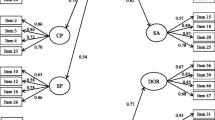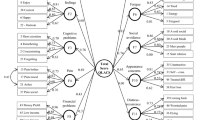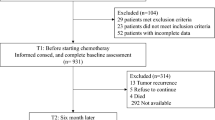Abstract
Purpose
The Impact of Cancer Scale (IOC) is a self-assessment tool designed to capture the unique and multidimensional aspects of the quality of life of long-term cancer survivors. This paper describes the adaptation and psychometric evaluation of its Italian version.
Methods
After the adaptation (i.e., removal of nonpertinent items and back-translation procedure), the Italian version of IOC has been administered to a sample of Italian long-term cancer survivors (people free from cancer and its treatments for at least 5 years) together with the Short Form 36 Health Survey Questionnaire, the European Organization for Research and Treatment of Cancer Quality of Life Questionnaire Core 30, and the Post-Traumatic Growth Inventory.
Results
Data on 304 participants were analyzed. Exploratory factor analysis revealed a three-factor structure composed of Uncertainty/Worry about Health & Future (13 items), Personal Growth & Altruism (14 items), and Dissatisfaction & Life Interferences (10 items). Internal consistency (Cronbach's alpha, >0.77) and temporal stability (Spearman's rho, >0.70) were good for all three factors. The obtained three factors correlated with the theoretically pertinent subscales of the other administered tools. To facilitate cross-cultural comparisons, reliability and convergent/divergent validity data for the eight-factor IOC structure already described in literature (Impact of Cancer Version 2) have been also provided.
Conclusions
This study supports the use of the IOC in Italy as a trifactorial instrument that is able to isolate aspects characteristic of the condition of long-term cancer survivorship. However, subsequent studies are needed to confirm these findings as well as shed more light on the validity of the IOC construct and its cultural variability.
Similar content being viewed by others
References
Stein KD, Syrjala KL, Andrykowski MA (2008) Physical and psychological long-term and late effects of cancer. Cancer 112(11 suppl):2577–2592
Foster C, Wright D, Hill H, Hopkinson J, Roffe L (2009) Psychosocial implications of living 5 years or more following a cancer diagnosis: a systematic review of the research evidence. Eu J Cancer Care (English) 18:223–247
Harrington CB, Hansen JA, Moskowitz M, Todd BL, Feuerstein M (2010) It's not over when it's over: long-term symptoms in cancer survivors—a systematic review. Int J Psychiatry Med 40:163–181
Annunziata MA, Muzzatti B, Bianchet K, Berretta M, Chimienti E, Lleshi A, Tirelli U (2009) Sopravvivere al cancro: una rassegna sulla qualità di vita nella cancer survivorship. Psicologia della Salute 10:55–71
Tedeschi RG, Calhoun LG (1996) The Posttraumatic Growth Inventory: measuring the positive legacy of trauma. J Traumatic Stress 9:455–472
Pearce NJM, Sanson-Fisher R, Campbell HS (2008) Measuring quality of life in cancer survivors: a methodological review of existing scales. Psycho-Oncol 17:629–640
Muzzatti B, Annunziata MA (2013) Assessing quality of life in long-term cancer survivors: a review of available tools. Supp Care in Cancer. doi:10.1007/s00520-013-1912-6
Zebrack BJ, Ganz PA, Bernaards CA, Petersen L, Abraham L (2006) Assessing the impact of cancer: development of a new instrument for long-term survivors. Psycho-Oncol 15:407–421
Crespi CM, Ganz PA, Petersen L, Castillo A, Caan B (2008) Refinement and psychometric evaluation of the Impact of Cancer Scale. J Natl Cancer Inst 100:1530–1541
Crespi CM, Smith SK, Petersen L, Zimmerman S, Ganz PA (2010) Measuring the impact of cancer: a comparison of non-Hodgkin lymphoma and breast cancer survivors. J Cancer Surviv 4:45–58
Dahl HA, Gudbergsson SB, Dørum A, Fossa SD, Liavaag AH, Sørebø Ø (2012) The impact of cancer scale version 1: psychometric testing of the Norwegian translation in a heterogeneous sample of cancer survivors. Qual Life Res 21(8):1459–1470
Oerlemans S, Smith SK, Crespi CM, Zimmerman S, van de Poll-Franse LV, Ganz PA (2012) Assessing the impact of cancer among Dutch non-Hodgkin lymphoma survivors compared with their American counterparts: a cross-national study. Psycho-Oncol. doi:10.1002/pon.3131
Crespi CM, Ganz PA, Petersen L, Smith SK (2013) A procedure for obtaining Impact of Cancer version 2 scores using version 1 responses. Qual Life Res 22(1):103–109
Guillemin F, Bombardier C, Beaton D (1993) Cross-cultural adaptation of health-related quality of life measures: literature review and proposed guidelines. J Clin Epidemiol 46:1417–1432
Hahn EA, Bode RK, Du H, Cella D (2006) Evaluating linguistic equivalence of patient-reported outcomes in a cancer clinical trial. Clin Trials 3:280–290
Kazdin AE (1992) Research design in clinical psychology. Prentice Hall, New York
Ware JE, Snow KK, Kosinki M, Gandek B (1993) SF-36 Health Survey—manual and interpretation guide. The Health Institute, Boston
Aaronson NK, Ahmedzai S, Bergman B, Bullinger M, Cull A, Duez NJ, Filiberti A, Flechtner H, Fleishman SB, de Haes JC (1993) The European Organization for Research and Treatment of Cancer QLQ-C30: a quality-of-life instrument for use in international clinical trials in oncology. J Natl Cancer Inst 85:365–376
Apolone G, Mosconi P, Ware JE (1997) Questionario sullo stato di salute SF-36, manuale d'uso e guida all'interpretazione dei risultati. Guerini e Associati, Milano
Apolone G, Filiberti A, Cifani S, Ruggiata R, Mosconi P (1998) Evaluation of the EORTC QLQ-C30 questionnaire: a comparison with SF-36 Health Survey in a cohort of Italian long-survival cancer patients. Ann Oncol 9:549–557
Prati G, Pietrantoni L (2013) Italian adaptation and confirmatory factor analysis of the full and the short form of the Posttraumatic Growth Inventory. J Loss Trauma. doi:10.1080/15325024.2012.734203
Cronbach L (1951) Coefficient alpha and the internal structure of test. Psychometrica 16:297–334
Burnand B, Kernan WN, Feinstein AR (1990) Indexes and boundaries for 'quantitative significance' in statistical decisions. J Clin Epidemiol 43:1273–1284
Bartlett MS (1954) A note on multiplying factors for various chi-square approximations. J Royal Statist Soc 16:296–298
Kaiser H (1974) An index of factorial simplicity. Psychometrika 39:31–36
Acknowledgments
The authors wish to thank Dr. Patricia A. Ganz, MD and Dr. Catherine M. Crespi, PhD for their precious advice on the first draft of the paper and Ms Anna Vallerugo, MA, for her writing assistance.
Author information
Authors and Affiliations
Corresponding author
Rights and permissions
About this article
Cite this article
Muzzatti, B., Flaiban, C., Romito, F. et al. The Impact of Cancer Scale (IOC) in Italian long-term cancer survivors: adaptation and psychometric evaluation. Support Care Cancer 21, 3355–3362 (2013). https://doi.org/10.1007/s00520-013-1909-1
Received:
Accepted:
Published:
Issue Date:
DOI: https://doi.org/10.1007/s00520-013-1909-1




